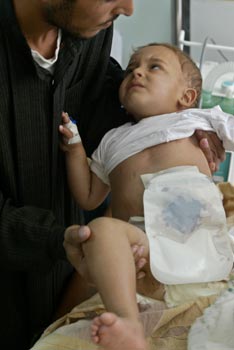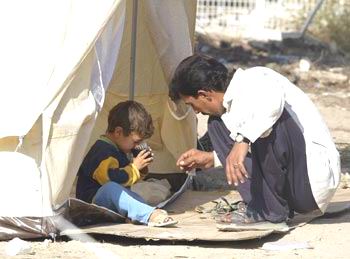
A 2-year-old Iraqi boy has lost one leg after his home was fired
by a bomb, Nov. 13, 2004. He was transferred to a hospital in Baghdad
afterwards. (AFP photo)

A father and his son escaped from Fallujah live in a
tent in Baghdad, Nov. 13, 2004. (Xinhua/AFP Photo)
Fallujah was witnessing a humanitarian disaster and in desperate need for
international aid,a spokeswoman of the Iraqi Red Crescent Society (IRCS) told
Xinhuaon Saturday.
In an exclusive interview with Xinhua, Ferdus al-Ibadi,spokeswoman of the
major Iraqi relief agency, said there was a "humanitarian disaster" inside
Fallujah.
"There are diseases killing children, pregnant women aborted,old and wounded
people dying in the streets ... bodies rotten inthe streets, let alone the
occupation of the main hospital and eventhe destruction of health clinics,"
Ibadi told Xinhua.
A convoy delivering necessities entered Fallujah late Saturday.The convoy
sent by the IRCS on Saturday comprised five trucks,three ambulances and a
minibus carrying food and medical supplies,drinking water, and more than 30
volunteers, including doctors,Ibadi said.
The convoy was earlier held up by US troops manning a checkpointoutside
Fallujah, arguing that the road was precarious.
"Whether the US troops give us the green light to enter or not,we are
determined to go ahead to enter the city," Ibadi said in heroffice in western
Baghdad.
Just Minutes earlier, Iraqi national security advisor QassimDawood told a
press conference in Baghdad that the US-Iraqi massiveassault on Iraq's once
rebel-held city of Fallujah had ended, withover 1,000 insurgents killed and 200
captured.
Meanwhile, 22 US and five Iraqi soldiers were killed in theoperation and 178
US soldiers were injured, according to the USmilitary.
However, Dawood did not give any civilian casualties and onlysaid 90 percent
of the residents in Fallujah had fled the citybefore the operation started on
Monday, complained Ibadi.
The IRSC, major aid agency in Iraq, had previously sent a letterto the US-led
forces, asking for permission to enter the besiegedcity, but was only allowed to
visit the refugee camps outsideFallujah because of the "dangerous situation"
there, noted thespokeswoman.
Ibadi called on the international media to shed light on thevolatile
situation of more than 150 families still trapped in theheart of Fallujah and
thousands of people in refugee camps andvillages outside the city.
"Media coverage will be a big plus for us since help is badlyneeded," she
said.
"We have received some help from world humanitarian bodies tothe Iraqi Red
Crescent Society, and the aid workers now have gainedsome back from the world,
but it is not enough, and they have tobuy the basic necessities from the market,
which are neverthelessfar from enough," she complained.
"We need every hand in the world to help people everywhere inIraq," Ibadi
underlined.
Under an authorization from Iraqi Prime Minister Ayad Allawi,the US and Iraqi
forces broke into Fallujah on Monday to clear thecity of insurgents. The
operation was said to help pave way for thegeneral elections due in January.
The US marines said no innocent people were killed during thesix-day-long
battle, but women fleeing the city days after theoutburst of fighting said they
saw bodies of children thrown intothe Euphrates River.
Correspondents and eyewitnesses sometimes reported civilianswounded and even
killed in bombardments or by shrapnels. Ananonymous doctor also said some
children died without apparentindications of injury.
A letter attributed to the people of Fallujah obtained by Xinhuasaid the dead
and wounded were scattered in the streets and USsnipers were shooting at
everything moving including those tryingto rescue the injured.
All the infrastructure and medical clinics were destroyed in theUS
bombardments, and doctors and their aides were among thedeceased, added the
letter.



